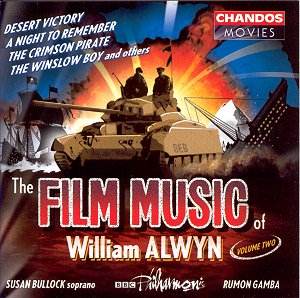This
is Chandosís second collection of Alwyn film music.
The
Crimson Pirate (the overture from which is on one of the Silva
Screen Prague CDs) reeks of Baghdad and the casbah. We are into
the same territory as Herrmann's Sinbad music with the
odd cross-current of janissary music. Of course there is also
some boozy Arnoldian humour in the bassoon writing at 3.32.
Green
Girdle is much more romantic. I had just been listening to
Muti's Scriabin and I thought of that as well as of Debussy. Other
reference points include the playful enchantment and the skittering
joy of Bridge's Enter Spring and the second of his Two
Jefferies Poems.
Take
My Love is given a superheatedly operatic spin with Susan
Bullock not sparing the horses with her vibrato. A Night to
Remember is all truculently surging lyricism punctuated by
the rattle of the side drum. It even has a whistling siffleur
to complete the picture - jaunty, winking, fluttery. A touch of
Walton's Façade here. It has a rustic polka and
a sentimental song of which Yuri Torchinsky's solo violin makes
the most.
Alwyn's
war work included the score for Desert Victory which has
about it something of John Ireland's Epic March. It includes
great work from the trumpets and a string sound that is both clean
and lush. Track 13 sounds very much like the style of his fellow
film wage-slave, Alan Rawsthorne.
The
Winslow Boy, after its Elgarian prelude, has some of the hunted
uncertainty of the score for Odd Man Out and the regretful
nostalgia of some of Elgar's smaller pieces and of the Second
Symphony.
Alwyn
treats us to a flouncy dilly of a grand waltz in In Search
of the Castaways as well as a raffishly no-holds-barred rumba
à la Milhaud. It is uninhibited stuff though prolonged
beyond the sustenance of its material. It parallels the calypso
from The Rakes Progress in vol 1.
The
music for State Secret reeks of Ruritanian bombast, spiked
helmets, Warner Brothers uniforms, archimandrites and shakoes.
The Grand Ball takes us back to the shipís waltz from the
Castaways score. We are treated to the vulgar vaudeville
raspberry of theatre music. There is also the hesitation and restraint
of one of Herrmann's dangerous and irresistible long lyric string
hymns in On the barge. The sunrise effulgence of the finale
is touched heavily with a Ruritanian swagger stick.
This
disc has all the thump and swoon of the Charles Gerhardt and George
Korngold Classic Film Scores series with The BBC Phil doing
the honours in place of Sidney Sax's National Philharmonic of
yore.
The
presentation is the stuff of which awards are made.
This
set would not have existed without the painstaking and style-sensitive
diligence of Philip Lane who had to reconstruct the scores from
the film soundtracks. This series owes as much to Lane as CPO's
Frankel film music owes to Dmitri Kennaway. It was all necessitated
by the same crass studio attitude that consigned parts and scores
to the landfill and incinerator. Long may such Lazarus-like reanimation
continue.
Apart
from the final section of Desert Victory, A Night to
Remember and The Crimson Pirate these are premiere
recordings.
And
the good news ... yes more good news ... when you have had you
fill of this there is still volume 1 on CHAN 9243 although with
a different team - Hickox and the LSO and with the late Christopher
Palmer as the reanimator.
If
you would like to try some of the concert music then track down
the Chandos versions of the Symphony No. 1 and the Lyra Angelica
(for harp and orchestra) - you will not be disappointed. If
you see the Lyrita Recorded Edition versions of these works then
do not hesitate.
Another
palpable hit from the Chandos film music. I hope that they do
not let Mr Gamba slip from their grasp (outstanding in the 2003
Proms concert of British film music). Now how about Philip Lane
and Maestro Gamba grappling with Brian Easdale's music for Black
Narcissus and A Matter of Life and Death?
Rob Barnett
see
also review by Ian
Lace
Visit
the William
Alwyn Website
